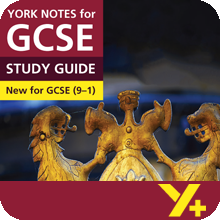Examiner's Notes
You assessed this answer as Grade 7.
Hover over the highlighted text to read the examiner’s comments.
Question: Read from Act I Scene 3 ‘Marry, that “marry” is the very theme/I came to talk of’ (line 44) to ‘Go, girl, seek happy nights to happy days’ (line 85). At this point in the play, Lady Capulet talks with her daughter about the prospect of marriage.
Starting with this conversation, explore how Shakespeare presents parents and children.
Write about:
- how Shakespeare presents Lady Capulet and Juliet’s relationship in this conversation
- how Shakespeare presents parents and children in the play as a whole.
Act I Scene 3 helps us to contextualise the relationship that Juliet has with her parents. As a fourteen-year-old girl, she is visited in her chamber by her mother, to be presented with the opportunity for marriage. Her mother, distant and somewhat calculating, presents this as an opportunity for increased wealth and to ensure her daughter becomes one of the ‘ladies of esteem’ who are ‘made already mothers’ among the Veronese elite.
Juliet’s mother's language, with its blunt interrogatives such as: ‘Tell me . . . How stands your disposition to be married?’ and ‘What say you, can you love the gentleman?’, is presented by Shakespeare in stark contrast to the warm effusiveness of the Nurse, whose enthusiasm is shown when she exclaims: ‘A man, young lady! Lady, such a man!’ Likewise, Lady Capulet’s impatience with the Nurse is evident when she says, ‘I pray thee hold thy peace.' This seems to stem from the fact that the Nurse is full of anecdotes about her beloved Juliet and her childhood, something Lady Capulet clearly does not share.
We are therefore encouraged to see that in wealthy Veronese society, the notion of parenting is one of a more distant relationship. Though both Capulet and Lady Capulet declare their love for Juliet when she is supposed dead in Act IV, their actions and attitudes at other times in the play lead us to question its strength.
In the extract, Lady Capulet uses elaborate language to describe Paris. She employs the metaphor of a ‘precious book’, suggesting Juliet will be the ‘cover’ that this ‘unbound lover’ lacks. Though seemingly romantic, this is far from the reality of marrying a virtual stranger, selected by Juliet’s father. Lady Capulet emphasises two positive features about Paris: his looks and his wealth. She suggests he has been drawn with, ‘beauty’s pen’ and that Juliet might ‘share all that he doth possess’. Again, this helps us to see the values that shaped elite Veronese society, and raises questions about Lady Capulet’s idea of what real love might be.
Capulet initially speaks of Juliet in gentle terms as ‘the hopeful lady of my earth’, and insists it will be another two years before Juliet should be wed. However, the violent actions of Act II seem to galvanise him, Tybalt’s death a clear catalyst which encourages him to hastily arrange Juliet’s marriage to Paris. Perhaps he fears for his family’s reputation within the context of these violent outbursts? Moreover, his position as the family patriarch leads him to believe Juliet will consider this arrangement as ‘a sudden day of joy.’ His fury at her refusal leads to him addressing her in disparaging terms as ‘a wretched puling fool’, and ‘a whining mammet’. Rather than as a daughter, he views Juliet as a possession, declaring ‘I’ll give you to my friend.’ This is compounded by Lady Capulet’s curt, monosyllabic rejection, ‘I have done with thee.’
Shakespeare seems to contrast the Capulets with the more rarely seen Montagues, whose concern for their son and his sensitive moods, suggests their more genuine love for him. Indeed, we are told even before Montague learns of his son’s death at the end of the play that Lady Montague has died of grief, so distressed was she by Romeo’s banishment. Much earlier, Montague has engaged Benvolio’s help to ‘learn from whence his sorrows grow’. Yet we are led to question why Romeo did not seek the advice of these concerned parents, rather than that of Friar Laurence, when he discovered his love for Juliet.
Though the play presents us with a picture of parenting in wealthy Veronese society, Shakespeare also conveys the idea that young adults may see their parents as a potential hurdle to their happiness and, equally, how some parents feel that they must exert complete control over their children. The backdrop of the feud and the conventions of the society itself create the conditions in which mistrust and tragedy come to dominate these family relationships.
